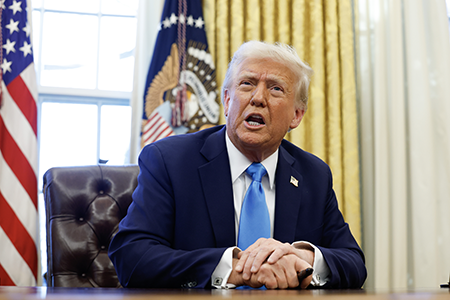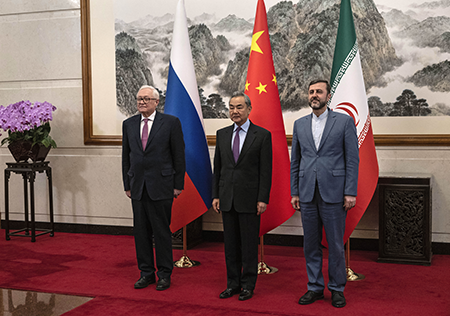Trump Sends Iran Letter Amid Military Threats
April 2025
By Kelsey Davenport
U.S. President Donald Trump sent a letter to Iran’s supreme leader, Ayatollah Ali Khamenei, expressing interest in a nuclear deal, but the overture comes amid Iranian steps to expand its nuclear program and U.S. threats to strike Iran.

The contents of the letter—which was delivered to Iranian Foreign Minister Abbas Araghchi by an Emirati official on March 12—have not been made public. Trump, however, told Fox News in an interview March 7 that the letter says, “I hope you’re going to negotiate because if we have to go in militarily it’s going to be a terrible thing.”
The day the letter was delivered, Khamenei said Iran is not interested in talks with a “bullying government” and described the missive as an attempt to “deceive global public opinion.” He said the U.S. threat of military action is “irrational” and warned that Iran is capable of “delivering a reciprocal blow.”
Despite Khamenei’s skepticism that the Trump administration is serious about an agreement, Iranian President Masoud Pezeshkian responded to the letter. In a March 30 speech, he said that Iran “rejected” the possibility of direct talks in its response but emphasized that the “path for indirect negotiations remains open.”
Trump has not articulated his aim for an agreement, but National Security Advisor Michael Waltz suggested that the United States will press for Iran to dismantle its entire nuclear program.
In a March 16 interview with ABC News, Waltz said Iran can either “give up” its nuclear program, including its uranium enrichment activities, “in a way that is verifiable” or “face a whole series of other consequences.” He made a similar comment in February, saying that the United States will talk to Iran only if they want to “give up their entire program.”
Iran’s mission to the UN tweeted on X that Iran would consider negotiations if the objective would be to “address concerns vis-à-vis potential militarization” of the country’s nuclear program but that talks “will never take place” if the goal is to discuss dismantlement.
Iranian officials met their Chinese and Russian counterparts in Beijing March 14 to discuss the nuclear issue. In a joint statement released after the meeting, the three countries called for the termination of “all unlawful unilateral sanctions” and called for dialogue based on “mutual respect.” The statement said all parties should refrain from “any action” that escalates the situation. The trilateral meeting came after Russian President Vladimir Putin’s offer to mediate between Iran and the United States, but it is not clear if the two sides will accept Moscow as an intermediary.
Heightened regional tensions could affect Iran’s willingness to engage the Trump administration. Trump said he will hold Iran “fully accountable” for any further action by Houthi militants that threatens shipping lanes and U.S. interests. Trump made the statement on Truth Social after large-scale U.S. airstrikes began targeting Houthi-controlled areas of Yemen March 15. The Houthis increased military activities in the region after Israel announced it would block aid to Gaza.

Although Iran has provided military support and backing for the Houthi forces, it is not clear how much influence Tehran has on their actions. Trump, however, said the Houthi attacks “all emanate from, and are created by, IRAN.”
Trump’s direct outreach to Iran followed a quarterly report from the International Atomic Energy Agency (IAEA) that noted a significant increase in Iran’s stockpile of uranium enriched to 60 percent uranium-235, a level close to the 90 percent U-235 that is considered weapons grade.
The Feb. 26 report said Iran produced 91 kilograms of uranium enriched to 60 percent U-235 over the quarter, bringing the total stockpile of 60 percent U-235 material to 275 kilograms. Over the previous quarter, Iran had only produced about 18 kilograms of uranium enriched to 60 percent U-235. The significant increase in the stockpile was expected after Iran notified the agency of its intention to increase production of 60 percent U-235 material at its Fordow enrichment facility in December.
In a March 4 joint statement to the IAEA Board of Governors, France, Germany, and the United Kingdom called the increase in 60 percent U-235 material “alarming.” They said that “Iran has chosen to escalate its nuclear program … beyond any credible civilian use, thereby causing a proliferation crisis” and reiterated their commitment to a diplomatic solution.
IAEA Director-General Rafael Mariano Grossi called for diplomacy with Iran in a March 3 press conference. He said that “high-level engagement is indispensable.” He also called for concrete results on the IAEA’s yearslong investigation into undeclared Iranian nuclear activities from the pre-2003 period, saying it is time to “stop talking about process and start getting some answers.”
France, Germany, the UK, and the United States expressed similar concerns about the outstanding safeguards investigation in a March 5 statement to the board. The four countries said that “Iran must fully cooperate” with the IAEA or “the board must be prepared to find Iran in noncompliance” with its safeguards agreement.
